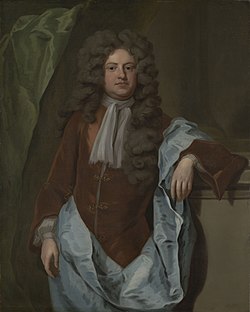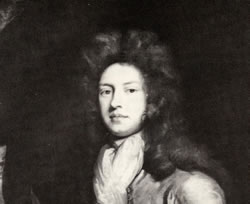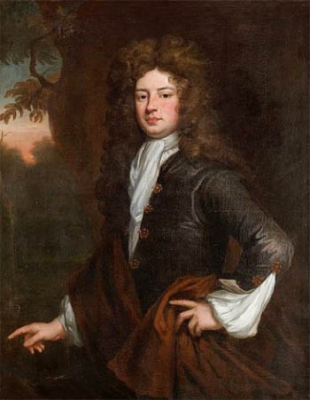Charles Montagu, 1st Earl of Halifax
Charles Montagu, 1st Earl of Halifax, KG, PC, FRS (* April 16, 1661 in Horton, Northamptonshire, † May 19 1715 in London ) was an English politician and poet.
Life
Montagu was the fifth son of Henry Montagu, 1st Earl of Manchester. He was first, then formed on the land at Westminster School. In 1682 he followed his friend George Stepney to Cambridge. There he met Isaac Newton to know and appreciate.
1685 made his verses on the death of King Charles II such an impression on the poet Charles Sackville, 6th Earl of Dorset, that this invited him to London. In 1689 he was elected as a Whig to parliament. Soon afterward, he became a member of the Privy Council, in 1697 Chancellor of the Exchequer.
Political significance
In this position, he developed a system of guaranteed government bonds, with which the British participation could be financed at the Palatine War of Succession. 1694 he set up the proposal, William Paterson, the Bank of England. A year later, he proceeded to the old monetary system (partly from the time of Elizabeth I ) to be replaced by new coinages. To this end, he called his friend Isaac Newton in the office of Warden of the Mint.
In 1698 he was - in the absence of the king - one of the regents. The following year, an impeachment case against him was launched by the Tory majority in the lower house, the House of Lords could block. 1700 Montagu was raised as Baron Halifax in the hereditary nobility. In the first Parliament in the reign of Queen Anne, he was again attacked by the Tories. 1706/7 Montagu was instrumental in the annexation of Scotland.
After the death of Anne in 1714, he became one of the regents again until the Elector of Hanover when George I. ascended the throne. From this he was made Earl of Halifax, was added to the Order of the Garter, and First Lord of the Treasury. After only seven months in this office Montagu died unexpectedly of pneumonia.
In 1687 he co-authored with Matthew Prior "The Country Mouse and the City Mouse", a parody of " The Hind and the Panther " by John Dryden.
The title Earl of Halifax was extinguished with his death, but probably his nephew George Montagu was due to a particular successor clause Baron Halifax.









